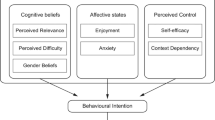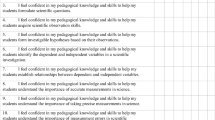Abstract
This study used a modified version of the Perception of Science Classes Survey (Kardash & Wallace, 2001) to survey 7,885 grade school and high school students in different provinces in the Philippines regarding their perceptions of their science classes. Factor analysis revealed five dimensions of the students ’ perceptions that relate to different aspects of the teacher ’s pedagogy and the learning environment created by the teachers: (a) Learner-Centered Pedagogy, (b) Science Inquiry Activities, (c) Positive Affect and Attitudes, (d) Grades as Feedback, and (e) Support for Self-Learning and Effort. Factor scores were compared across grade levels and genders. The results indicate a decrease in science inquiry activities and the use of grades as feedback in the higher grades, but an increase in support for self-learning and effort, and also positive affects and attitudes. These trends were discussed in relation to possible problems related to teacher practices that may contribute to low student achievement levels in science.
Similar content being viewed by others
References
Bernardo, A. B. I. (1998). Do you know where you ’re going? Global trends in mathematics and science education reform and their implications for Philippine reform efforts.UP -CIDS Chronicle, 3(2), 91–100.
Bernardo, A. B. I. (1999). Contemplating a scientific science education reform.The Manila Journal of Science, 2(1), 61–63.
Bernardo, A. B. I. (2002). Teachers, the problem of learning, and reform in math and science education.Ateneo de Zamboanga Journal of Multidisciplinary Studies, 2(1), 1–20.
Bernardo, A. B. I. (2004). Constructivism, curriculum and the challenges in transforming science education in the Philippines.Learning Edge, 4, 1–33.
Golla, E. F., & de Guzman, E. S. (1998). Teacher preparation in science and mathematics education: A situation analysis. In E. B. Ogena & F. G. Brawner (Eds.),Science education in the Philippines: Challenges for development (pp. 41–78). Taguig, Metro Manila: NAST, SEI, UP-CIDS.
Kardash, C. A., & Wallace, M. L. (2001). The perception of science classes survey: What undergraduate science reform efforts need to address.Journal of Educational Psychology, 93, 199–210.
Martin, M. O., Mullis, I. V. S., Gonzalez, E. J., & Chrostowki, S. J. (2004).TIMSS 2003 International science report: Findings from IEA ’s Trends in International Mathematics and Science Study at the eighth and fourth grades. Chestnut Hill: MA: Boston College. Retrieved March 29, 2007, fromhttp:// timss.bc.edu/timss2003i/scienceD.html.
Nebres, B. F., & Intal, A. M. G. (1998). The challenge of developing science culture in the Philippines. In E. B. Ogena & F. G. Brawner (Eds.),Science education in the Philippines: Challenges for development (pp. 29- 40). Taguig, Metro Manila: NAST, SEI, UP-CIDS.
Nebres, B. F., & Vistro-Yu, C. P. (1998). A look at organizational structure for an effective delivery of science education. In E. B. Ogena & F. G. Brawner (Eds.),Science education in the Philippines: Challenges for development (pp. 151–170). Taguig, Metro Manila: NAST, SEI, UP-CIDS.
Osborne, J., & Dillon, J. (2008).Science education in Europe: Critical reflections. London: The Nuffield Foundation.
Seymour, E. (1992). “The problem iceberg” in science, mathematics, and engineering education: Student explanations for high attrition rates.Journal of College Science Teaching, 21, 230–238.
Seymour, E. (1995). The loss of women from science, mathematics, and engineering undergraduate majors: An explanatory account.Science Education, 79, 437- 473.
Seymour, E., & Hewitte, N. M. (1997).Talking about leaving: Why undergraduates leave the sciences. Boulder, CO: Westview Press.
Strenta, A. C., Elliot, R., Adair, R., Matier, M., & Scott, J. (1994). Choosing and leaving science in highly selective institutions.Research in Higher Education, 35, 513–547.
Tobias, S. (1990).They ’re not dumb, they ’re different: Stalking the second tier. Tuczon, AZ: Research Corporation.
Author information
Authors and Affiliations
Corresponding author
Additional information
This research was part of a research project commissioned by the Japan International Cooperation Agency-Philippines.
Rights and permissions
About this article
Cite this article
Bernardo, A.B.I., Limjap, A.A., Prudente, M.S. et al. Students ’ perceptions of science classes in the Philippines. Asia Pacific Educ. Rev. 9, 285–295 (2008). https://doi.org/10.1007/BF03026717
Received:
Revised:
Accepted:
Issue Date:
DOI: https://doi.org/10.1007/BF03026717




